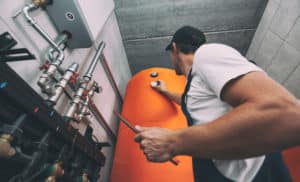Difference Between Salvage and Skilled Labor Allows Mesothelioma Claim to Move Forward
Before it became known that asbestos causes malignant mesothelioma, the material was widely used in a variety of applications including as insulation in commercial boilers. Boiler manufacturer Cleaver-Brooks, Inc. was recently named in a personal injury suit seeking compensation for plumber Ernest G. Smith’s diagnosis with the rare form of cancer. Though the company attempted to evade liability by pointing to a decision in a similar case filed by a salvager, the judge in the case noted the difference between the work done by a skilled laborer and that done by an individual whose work involves indiscriminate actions.

Plumber’s Mesothelioma Blamed on Asbestos in Cast-Iron Sectional Boilers
In the mesothelioma lawsuit filed against boiler manufacturer Cleaver-Brooks, Inc. by Ernest G. Smith and his wife, the couple point to his work disassembling the company’s boilers between 1984 and 1989. The company initially responded by arguing that since they’d only begun manufacturing the boilers in 1985, the equipment that Smith worked with would not have been old enough to require the type of work that he described in his claim. Expert witnesses debunked this assertion, and the company’s petition for summary judgment was dismissed.
The company then filed a second motion for summary judgment, arguing that the mesothelioma claim against them should be dismissed because a judge in a separate case had dismissed an asbestos claim filed by a salvager. That dismissal had been based upon the asbestos company having successfully argued that the salvager’s exposure to the substance within the boiler could not have been foreseen.
Judge Notes Difference Between Foreseeability of Asbestos Exposure in Two Different Mesothelioma Victims
In her decision regarding Cleaver-Brooks’ second motion for summary judgment, Judge Sherry Klein Heitler of the Supreme Court of the State of New York acknowledged her colleague’s decision in the salvager’s mesothelioma claim, but noted the significant difference between the foreseeability of a plumber’s exposure to asbestos and to that of a person whose job “consisted of ripping, cutting, breaking, and smashing, anything he could to salvage the desired metal for his employer.”
While sympathetic to the salvager’s mesothelioma diagnosis, she said that Mr. Smith’s “skillful preparation of boiler equipment for removal was an integral, direct, necessary, and therefore foreseeable aspect of product replacement projects,” and that therefore the company can be held liable for its failure to warn of the dangers that his job presented.


FREE Financial Compensation Packet
- Info on law firms that will recover your HIGHEST COMPENSATION
- Learn how to get paid in 90 days
- File for your share of $30 billion in trust funds

